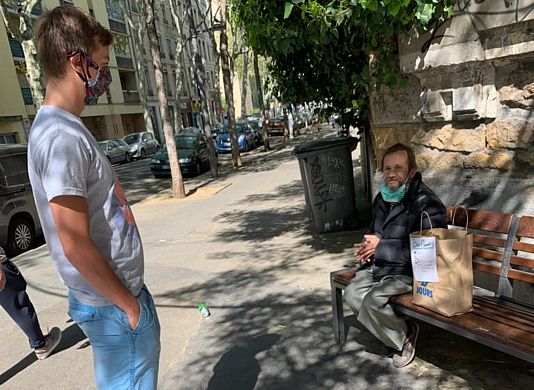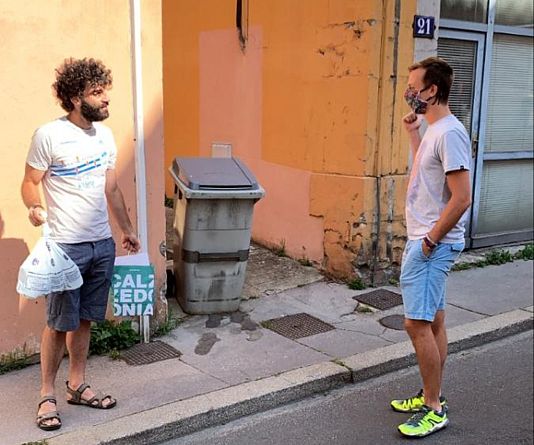For homeless people, the COVID-19 pandemic represents an unprecedented threat. Maxime is one of the volunteers who shows that community has never been so important.
On Tuesday, March 17, the streets of France emptied. The instructions were clear: stay home.
But where do you go when you live on the streets?
For homeless people all over Europe, the lockdown didn’t mean confinement, but even more hunger and uncertainty than they are used to.
The associations and charities usually helping these people faced numerous problems, such as a lack of adequate protection material and volunteers. Many of their regular volunteers were older people, the most vulnerable population, and so could no longer donate their time.
That is when young people like Maxime Klimaszewski, decided to act. The 28-year-old joined the #PourEux movement, an initiative created during the confinement to deliver food to the homeless in France.
The structure is simple and smart. Volunteer cooks can register their packed meals on the website. Volunteer delivery drivers pick up the food and distribute it to those in need.
“Everyone can help at their level," says Maxime. "It doesn't take a lot of time or a lot of money and it can help the daily life of a lot of people”, he says.
Françoise, a volunteer cook, is also happy to participate in this initiative. Although her age doesn't allow her to be at the forefront of the battle, she helps from her kitchen. The packed meal she prepares always has a starter, a main dish and a dessert, and often a friendly little letter she slips inside.
“We are very happy to share this meal with you. We hope it will be a shared joy”, she writes.
Eric, a homeless man living on the streets of Lyon, is also glad to receive a comforting meal and a chat. After two months, he knows Maxime very well, they even exchange books. He is excited to discover that in addition to a chicken main plus a starter, he also got a chocolate dessert. “A feast! A balanced meal!”, he rejoyces.
During the lockdown, the solidarity of his neighbours was essential to him staying strong, Eric says. But unlike them, his life will not turn around as restrictions ease.
“I'm confined here or confined there”, adds Eric.
Homeless deaths expected to rise
The Abbé-Pierre foundation estimates that at the end of 2019, around 250,000 people were living in an emergency accommodation centre or a reception centre for asylum seekers. Four million people are poorly housed in France. But there are no real figures on homeless people, the ones seeking shelter on the streets, under bridges or on a park bench. Eric is just one of many.
To cope with the crisis, France has opened special centres to treat homeless people suffering from COVID-19 who do not need hospitalisation. President Emmanuel Macron has also extended the measures to protect the vulnerable population during the winter. But even though emergency winter accommodation centres remain open and no one can be evicted from their homes until 31 May, there is still not space for everyone.
The situation appears to be getting worse for families and children. In its annual report on the state of housing in France 2020, the Abbé-Pierre foundation warns that in November 2019, according to several associations, between 500 and 700 children were rejected every night in emergency accommodation centres in Paris.
According to the Centre d'Action Sociale Protestant (CASP) association, 158 babies were born on the streets of Paris in 2019, against 100 in 2018 and 49 in 2017.
The Collective “Les Morts de la Rue” (The Dead of the Streets) estimates 495 deaths in 2019 and 683 in 2018. With the COVID-19 pandemic, the figure could be much higher this year.














